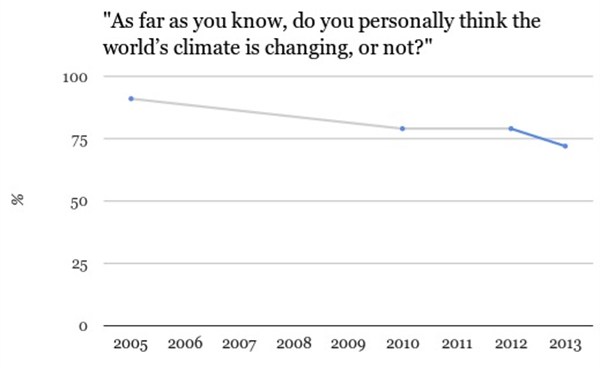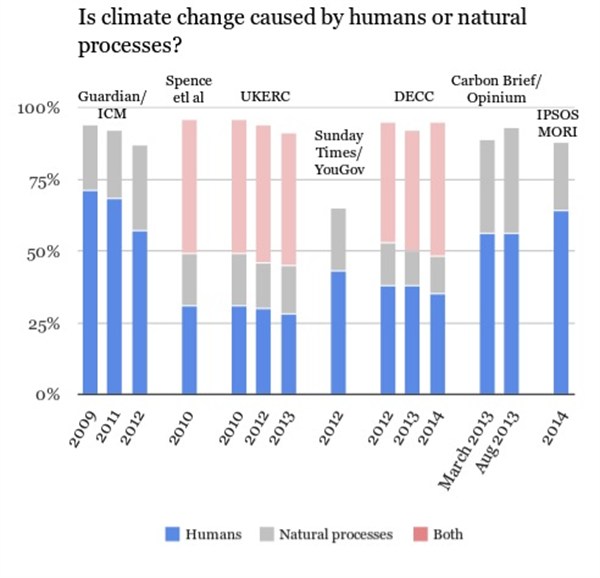Ros Donald
29.07.2014 | 3:30pmNewspapers love to cover surveys that show belief in climate change has risen or fallen. But how much can polls really tell us about what the UK public believes when it comes to climate change? We surveyed 14 polls to try and understand what’s happening.
We looked at polls by the Guardian, the Sunday Times, the Department of Energy and Climate Change (DECC), Carbon Brief ( twice), the UK Energy Research Council (UKERC) and Ipsos Mori.
The polls were released between 2009 and 2014, but UKERC’s poll includes earlier results from surveys in 2005, 2010 and 2012.
Belief in climate change
You might think the most obvious question to ask about climate change is the very simple one – whether people think it’s happening or not. But only four of the 14 polls we looked at phrased a question in this way.
All of them are summarised in the UKERC report. The results, taken in 2005, 2010, 2012 and 2013, indicate that ‘belief’ in climate change is high overall, and has remained pretty steady for the past five years.
79 per cent answered ‘yes’ to the question, “As far as you know, do you personally think the world’s climate is changing, or not?” in 2010 and 2012, and 72 per cent in 2013.
But in 2005, 91 per cent said ‘yes’. So compared with 2005, there appears to have been a fall in the number of people who answer yes to this question. 
Source: UK Energy Research Centre data, graph by Carbon Brief. The blue dots are data points. The grey line illustrates years there was no sequential data.
Causes of climate change
What about people’s views on what’s causing climate change? This approach is more popular. All 14 polls asked people what they think is causing climate change – whether they think it is mostly due to human or natural causes, or just isn’t happening at all.
The highest percentage of people saying climate change is mostly or entirely down to human activity was in August 2009, when 71 per cent of respondents to the Guardian/ICM poll said climate change is being caused mainly by human factors.
At that point, climate change awareness is likely to have been unusually high in the lead-up to international climate talks in Copenhagen.
Thereafter, the percentage of people answering questions that give them a straight choice between human and natural causes ranges between 43 per cent in the 2012 study for the Sunday Times by YouGov, and 68 per cent in the 2011 Guardian/ICM poll.
Carbon Brief’s polling in April and August 2013 suggested in both cases that 56 per cent of the UK public believes humans mostly cause climate change.
The most recent figure comes from Ipsos Mori’s Global Trends 2014 survey, which suggests 64 per cent of the UK citizens think human activity is largely to blame for climate change.
We should remember that the 14 surveys all phrased the question slightly differently, however. So with any really big differences, it’s quite likely that people were answering different questions rather than changing their views on climate change dramatically.
People like the middle ground
So far, we’ve talked only about polls that give people a straight choice between human and natural causes. Something interesting happens when people have the option to say climate change results from a bit of both, however.
Both the DECC poll and the surveys UKERC compiled offered respondents the opportunity to say climate change is a result of both human and natural activity.
In those surveys, between 42 and 48 per cent of respondents – an average of 45 per cent – state that climate change is the result of a mixture of human and natural factors.
This significantly reduces the number of people who say humans cause climate change, or those who say climate change is down to natural factors.
This may not be hugely surprising. Scientists are confidant humans are causing extra warming that has occurred in the atmosphere as a result of burning fossil fuels.
But the climate also experiences natural fluctuations – so actually it’s right to say human activity and natural factors combine. More pessimistically, the recent dominance of human influence may get obscured when media reports give voice to people who contest the majority scientific view.
Adding it up
Interestingly, if you ask people whether they think climate change is predominantly manmade or natural, the number of people who say climate change is happening is quite significantly higher than if they had answered a direct question about it, even when they’re given the option to say its not happening.
Take the 2010 survey in the UKERC study, for example. In response to a direct question, 78 per cent of respondents said they think climate change is happening, as opposed to 15 who say it’s not.
But in the ‘human caused or natural’ question, 96 per cent of people implicitly agreed climate change is happening – whether they thought it was because of human activity or natural cycles. Only two per cent of people said they thought the climate wasn’t changing.

Why the discrepancy? One answer may lie in the fact that the issue of human-caused climate change has become increasingly politically polarised.
Other factors
When studying polls, it’s important to understand not just what the questions ask, but what other factors may have influenced how people answer.
Writing about Carbon Brief‘s surveys, polling expert Leo Barasi says people’s political beliefs may well colour how they respond to such questions.
He says he suspects “people respond to questions about whether they ‘believe’ in climate change as if they’re being asked “are you a tree-hugging leftie who hates business?'”
This narrative has become increasingly prominent in recent years, which may partly explain why the number of respondents replying that they believe climate chagne is happening in the UKERC poll dipped after 2005.
In contrast, question about what people feel causes climate change may be more neutrally received.
As the 2010 study shows, more people will broadly agree that climate change is happening if they are allowed to express skepticism about what’s causing it – what scholars call ‘attribution skepticism’.
There’s also when the study was conducted to think about – and what the weather was like then.
Take the UKERC polling in our first chart, which asked, “As far as you know, do you personally think the world’s climate is changing, or not?”. It asked the same question at different times, but during very different weather conditions.
The 2005 poll was conducted in October and November 2005 – one of the warmest Octobers on record. March 2013, when the last poll was conducted was one of the coldest Marches in the historical series.
Barasi has pointed out that asking this question during extreme cold weather may push some people into doubting whether global warming is really happening. Short-term weather patterns have an effect on the way some people answer questions on climate change, as numerous studies have now indicated.
This suggests the dip down to 72 per cent ‘belief’ in climate change may have had more to do with the cold spring than any significant changes in people’s outlook. It certainly makes any claim that belief in climate change has ‘fallen’ look a little shakier.
So what can polls really tell us about what people think about climate change? Most people think it’s happening – and that number has remained high through the years. But the way you ask the question is likely to colour the response. All in all, inferring what people believe from how they answer is a tricky process.

